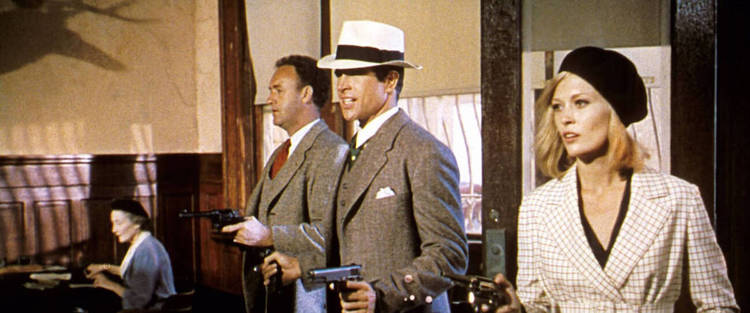


By Steve Sailer
12/21/2012

Noah Millman is appalled that Pat Buchanan implies that back in the good old days, respectable society didn’t celebrate criminals, and cites Bonnie and Clyde as an obvious counter-example.
But the cultural history of Bonnie and Clyde supports Pat’s memory. From roughly 1935 to 1965, crime rates were low (the red line above is the per capita homicide rate with the 1950s set as 100). In the exact same time, American elites tried hard to render actual criminals uninteresting and media glorification of criminals not respectable. As I said yesterday, Bill James reports on a newspaper barons' gentleman’s agreement after the Lindbergh’s Baby trial of early 1935 to cut back on tabloid coverage of crime. Similarly, the Hays Code the movie industry imposed upon itself in the early 1930s insisted that criminals be portrayed in a disapproving manner.
Bonnie and Clyde (who died violently in 1934) were part of a wave of criminals of the late Prohibition / early Depression era that were given huge news coverage and a fair amount of romantic outlaw spin (John Dillinger, Pretty Boy Floyd, Machine Gun Kelly, etc.). That era rapidly closed down around 1935, and with it homicide rates.
Which one is cause and which one is effect? Hard to say, but I can’t dismiss out of hand the notion that the elite culture’s bias in 1935-1965 against promoting criminals as big deals didn’t take the wind out of the sails of various low-lifes who might have acted upon their desires for notoriety in other eras when the publicity machinery was more favorable.
In 1967, Arthur Penn’s movie "Bonnie and Clyde" became a huge story and a big box office hit. In the histories of cinema written by the victors, it’s portrayed as a morality tale in which the cool new critics (e.g., Pauline Kael) triumphed over the stick-in-the-mud old critics (e.g., Bosley Crowther).
Crowther had been the chief movie reviewer of the New York Times for 27 years and was the champion voice of serious liberal uplift and respectability. To him, movies shouldn’t glamorize two-bit moron criminals like Bonnie and Clyde. He just didn’t get that in the new elite culture of the later 1960s, criminals were cool. From Wikipedia:
… the most dogged critic of the film was Bosley Crowther, who wrote three negative reviews, as well as periodically blasting the movie in reviews of other films, and also in a letters column response to unhappy Times readers. The New York Times replaced Crowther as its primary film critic in early 1968, and it was widely speculated that his persistent attacks on Bonnie and Clyde had shown him to be out of touch with current cinema, and weighed heavily in his removal.
I never saw "Bonnie and Clyde" until 1990, at which point it was hard to see what all the hub-bub had been about. From the perspective of 1990, it just looked like a glamorous Hollywood movie of recent years, distinguished mostly by having a ton of Hollywood star power (besides Warren Beatty and Faye Dunaway in the title roles, it featured then-little known future stars Gene Hackman and Gene Wilder).